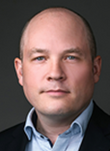 | Josef Weinbub Privatdoz. Dipl.-Ing. Dr.techn. Tel.Nr.: +43 1 58801-360 | Pubs | Diss | |
       | ||||
| Worked for the IµE from 01-01-2010 to 30-04-2024. | ||||
Biography (as of 30-04-2024): Josef Weinbub was an Associate Professor of High Performance Simulation in Micro- and Nanoelectronics. He obtained the doctoral degree in Computational Microelectronics and the venia docendi (habilitation) in the field of Micro- and Nanoelectronics from the TU Wien. He was a visiting researcher at the EPCC, University of Edinburgh and at the Device Modelling Group, University of Glasgow, Scotland, UK as well as at SILVACO Inc., Santa Clara, CA, USA. He founded the master’s program Computational Science and Engineering at the TU Wien and served as the chair of the curriculum commission since the inception of the program. He was involved with several international scientific conferences in various management and scientific roles. He was an Associate Editor of the Journal of Computational Electronics and a Principal Investigator of various research projects funded by, e.g., the Austrian Science Fund and the Christian Doppler Research Association. Together with his team he investigated cutting-edge research problems in the area of computational micro- and nanoelectronics. Josef Weinbub is an IEEE Senior Member and served as the Co-Chair of the IEEE Nanotechnology Council's Modeling and Simulation Technical Committee. Research Interests:Josef Weinbub’s research interests focused on developing and utilizing computationally highly demanding simulations in process TCAD and electron quantum transport to study cutting edge challenges in semiconductor fabrication and next generation electron-based quantum devices and systems. Regarding process TCAD, he particularly focused on parallel algorithm and data structure research with a particular focus on accelerating flux calculations. With respect to electron quantum transport, he focused on advancing a time-dependent particle Wigner simulation methodology. This is particularly relevant for the field of electron quantum optics, which studies electron-based quantum optics principles (e.g., interference of electron-wave) by being able to control individual electrons. He applied the developed methods by studying dynamic single electron and entangled double electron systems under the influence of electromagnetic fields, and thereby advanced the understanding of electromagnetic electron control, coherent electron sources and waveguides, as well as interferometers. Software Development:Particle Wigner Simulator: ViennaWD Research Topics:High Performance Computing Past Public Projects:CDG - Christian Doppler Laboratory for High Performance TCAD FWF - Wigner Transport Dynamics of Spatial Electron Entanglement EU - European Master For High Performance Computing FWF - General Nano-Electromagnetic Quantum Phase Space Model | ||||
